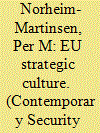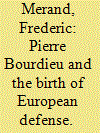| Srl | Item |
| 1 |
ID:
108776


|
|
|
|
|
| Publication |
2011.
|
| Summary/Abstract |
After being debated in academic circles for years, the idea of a common European Union strategic culture was elevated to a policy objective in the 2003 European Security Strategy. However, whether the European Union has a strategic culture or not is still up for debate. By drawing on developments in strategic culture theory, this article demonstrates that the idea of strategic culture is not only compatible with the European Union, but may be a particularly useful conceptual tool for studying actors for which cultural factors can make up for the lack of more material ones, such as borders, language, political structure, national history, and so on. Offering a fresh perspective on the European Security Strategy, it shows that a specific strategic culture has evolved in the EU, in which consensus on a comprehensive approach to security as a unique European asset has become a focal point for the fledgling European Security and Defense Policy (ESDP). However, the article concludes that this does not provide for a robust strategic culture. The repeated emphasis on the EU's unique potentials as a comprehensive security actor will also invite criticism if the EU fails to mount operations that reflect its own success formula.
|
|
|
|
|
|
|
|
|
|
|
|
|
|
|
|
| 2 |
ID:
097373


|
|
|
|
|
| Publication |
2010.
|
| Summary/Abstract |
This paper uses an analytical framework derived from Pierre Bourdieu's sociology to explain the genesis of the European Security and Defense Policy (ESDP). Long-term social and institutional processes at work in the making of ESDP are addressed through an emphasis on the institutionalization of social fields, the impact of structural crises, and the socialization of policy makers into specific schemes of perception and action (habitus). Two arguments follow from this framework. First, the paper shows that the creation of ESDP after 1998 would have been impossible without the prior institutionalization of two transgovernmental arenas: (1) the European foreign policy field, wherein EU diplomats vie for influence over EU policies; and (2) the international defense field, centered upon military relations within NATO. Second, ESDP results from the strategies of a number of diplomats and military leaders who, following the end of the Cold War, perceived that they faced important organizational crises in their respective fields. This sociological framework provides a more nuanced account of ESDP's creation than that proposed by the two dominant explanations in international relations theory-realism's balancing and constructivism's strategic culture convergence. Combining structural and ideational factors, it elucidates three empirical puzzles: the lack of opposition to ESDP when it was launched, the motives of policy makers who proposed ESDP, and the disappearance of alternative options for the European security architecture.
|
|
|
|
|
|
|
|
|
|
|
|
|
|
|
|